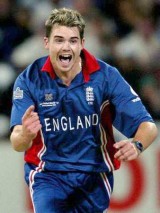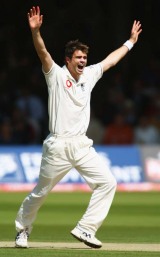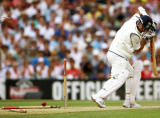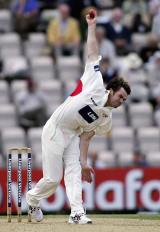Four years ago James Anderson rose to prominence in a flurry of designer hair and devastating bowling. It couldn't last and it didn't. Now he is leading England's attack and the poster boy has become a man
Anderson is thinking back to the start of his career - the one where he was an overnight sensation, where he was catapulted from his club side, Burnley, to
the England team within six months, where he briefly threatened, with his skaterboy looks and his Freddie Ljungberg hair, to make England cricket cool. "I loved
every minute," he says. "I wouldn't change a thing." He pauses. "But part of me does think, maybe, if I'd just had two or three years more to settle, I might have had a longer run at it." He smiles. "Then again, I might never have got the chance."

|

The early days
© Getty Images
|
|
Caught at a glance, he looks very much like the Anderson of four years ago, who appeared on the cover of the first issue of The Wisden Cricketer bearing such promise for the future. He is tall and still trendy and undeniably good-looking. He is, once again, in a designer t-shirt and jeans, although this time the logo on the t-shirt is more subdued. He looks taller, however, because he walks with a more upright step. He seems more in control of his body and of his situation than the loose-limbed 21-year-old he was in 2003. His face is different, too. His cheeks are more shaped, his eyebrows less heavy. To be blunt, he has stopped looking like a boy and started looking like a man.
After three years of limited visibility Anderson is back. In August the Indian team chose him as England's player of the Test series. He had taken 14 wickets and, still with only 19 Tests to his name, led England's most inexperienced attack in years to a creditable performance despite losing the series. A few days later he achieved his best
ODI bowling figures. For the first time in his career he was proving his worth consistently against top-class opposition, not to mention dismissing Sachin Tendulkar five times in six weeks.
Two images of Anderson's Indian summer will endure. One is that glorious clattering of Tendulkar's stumps in the third Test. The other is his
five-for at Lord's, which included India's big three - Tendulkar, Rahul Dravid and Sourav Ganguly - and secured Anderson his best Test figures. He is particularly proud of the ball that dismissed Ganguly. "What made it more special for me was the fact that I was bowling outswingers to him and that was, I think, the second inswinger I bowled at him. I don't think I could have bowled it better."
At the start of 2007 few would have predicted that Ryan Sidebottom and James Anderson would be the best bowlers of the summer. But injury to all five of the 2005 Ashes-winning bowlers left England facing India with an untested attack. Did it help, walking
into a dressing room with no remnant of that particular posse? Anderson thinks carefully about this. "Maybe," he says. "I guess when there's a few other guys around, there's not as much pressure on you and that can be a bad thing because you can think, 'Well, it doesn't
matter if I don't get the wickets, because someone else will.' It should never be like that."
Allan Donald, England's former bowling coach, took Sidebottom, Anderson and Chris Tremlett to one side before the first game and told them they must not use their inexperience as an excuse. He had already told Anderson he wanted him to lead the attack and Anderson relished the responsibility. "I enjoyed taking the first over, trying to set the tone for the rest of the game. It probably did help my performance."
Anderson's voice is deadpan. Ever since his arrival on the England scene his laid-back attitude fostered an inaccurate image of a sulky teenager without much to say. I remember, meeting him four years ago, being surprised at how wrong that impression was - Anderson was thoughtful and responsive about every question he was asked.
Today he is even more relaxed. He smiles widely and often, and is self-deprecating
about those three years of obscurity. "I still bowl the odd inswinger down the leg side" - he laughs - "and it keeps going and the keeper can't get it. But I'm a lot more consistent."

|

"...it's no coincidence that his good performances for England have come after bowling a
high volume of overs in county cricket..."
© Getty Images
|
|
Lancashire's cricket manager, Mike Watkinson, who has been working with him since he was a 17-year-old in the 2nd XI, says Anderson's demeanour has often been misconstrued. "When he was younger he was pretty quiet and quite shy around the place. In many instances people felt he hadn't got many good ideas. But he's a real thinker on the game. He puts a lot of time into analysing the opposition and he's quietly thorough in his personal preparation." Since the start of this summer Anderson has requested to
play as many games as possible for Lancashire - something that the new England coach, Peter Moores, has been much quicker to accommodate than Duncan Fletcher. "Everybody's a confidence player," says Watkinson, "but some people mask it better than others.
"James is not one of those people who can turn up whenever he feels like it and bowl how everyone wants him to. And it's no coincidence that his good performances for England have come after bowling a high volume of overs in county cricket."
For those who have been waiting to see Anderson fulfill his promise, his achievements this summer - unspectacular in themselves - have caused a ripple of satisfaction. Many, however, will require further proof. Anderson and consistency have been distant cousins at best. When we first met, a few months after his explosive start to international cricket, Anderson was suffering a humiliating change in fortune; 11 wickets against Zimbabwe and an ODI hat-trick against Pakistan had been followed by a thrashing - though the series was drawn - at the hands of Graeme Smith and his South African team. He said then his greatest asset was to be able to "come back stronger".
But Anderson's comebacks were infrequent and disappointing. His control deserted him. What had been a thrillingly instinctive ability to swing the ball into the stumps now looked like guesswork. His unorthodox head-down delivery, a charming quirk when it was taking wickets, was now heresy and there were rumours that he was undergoing a redrawing of his action. That, in turn, was blamed for his lack of confidence on the
few occasions he did get to the crease. He lost his place, first to James Kirtley, then to Simon Jones, and then to whoever else was available. In the years that followed, Anderson toured Bangladesh, Sri Lanka, South Africa and Pakistan with England. On those four tours he played just two Tests and had little more to do than bowl in the nets and keep his team-mates hydrated. Even in home series he was frequently called to the
squad as cover, only to be sent back to Lancashire where his county team were already two days into a Championship match. In the summer of 2004 he played seven first-class games, three of which were Tests.
Was Anderson ever able to enjoy the 12th man role, to which he was condemned so long? He ums and ahs, trying to think of a redeeming feature. "Not really, no. Not for me anyway. You don't feel part of it and it's quite hard being around. If there's a win, you might have run round like a madman all day filling people with drinks but you still don't get the same enjoyment.
"When you're not playing - and anyone will say the same thing, I'm sure - it's hard when other bowlers are doing well, even though everyone is good friends. I've been 12th man when Matthew Hoggard has been playing. He's one of my best mates in the team and I'm
really happy for him when he does well but at the same time you think that's one more place where I can't get in."
How was his relationship with Duncan Fletcher? He pauses, thinking carefully how to answer. "It was quite a difficult situation. You were expected to run around and look after everyone, but you also felt ignored at times. You're not playing, so you get brushed to
one side. You did feel a little bit left out and you could be made to feel a little bit left out as well. It was a pretty thankless job really because you're just expected to do it."

|

The big one: Anderson bowls Sachin Tendulkar
© Getty Images
|
|
In 2006 he married Daniella Lloyd, a model he had met two years previously while with the England team. Marriage has made him "a much happier person," he says. "At the start of my career all I thought about was cricket. That was the only thing in my life and, if I
wasn't playing it, I was watching it or I was thinking about it. If I had a bad game it would be the end of the world and I could be extremely grumpy around my friends. Now I've got a lot more to think about. I still have my moments where I'm a bit grumpy but I try and stay as upbeat as possible."
Certainly, if Anderson has had one problem as a bowler, it has been trying too hard, caring too much. A couple of years ago Angus Fraser told him to stop being such a perfectionist. He has learned the lesson. "I think that's one thing I've moved away from a little bit," he says, nodding at the realisation. "If I bowl a ball nine inches away from off stump, and I'm happy with it, I'll try and bowl the same ball - even if I think I'd rather be a little bit straighter. If you're always looking for the perfect ball, that's where mistakes creep in, and in the past they have done with me. Sometimes you do try a little bit
too much."
He has also had his share of seriously bad luck. Just as he seemed to be gaining confidence a stress fracture put him out of action for virtually the whole of last season. Returning to the England side last winter, he walked straight into an Ashes team that was carrion meat from the moment the toss was lost in Brisbane. Like many of those players, Anderson still struggles to speak of it lucidly, as if he were a trauma survivor. Then came the World Cup; Anderson broke a finger before England had played their first group match. "The doctor looked at my X-ray and I could see his face, it wasn't happy. I thought, 'Right, I'm going home.' I was gutted and thinking of places I could go on holiday."
Instead Anderson was offered the chance to play through the pain. He took it. "I thought after winning the CB Series, why can't we do well in the World Cup?" Following defeat by New Zealand in the opening game, he took to the pub with Jon Lewis and three
other players. It was the most ill-advised evening out since Britney and Paris last hit the town together. All five players were fined for "breaching team discipline", while somewhere nearby Andrew Flintoff was falling into the Caribbean sea in an incident that became known simply as Fredalo.
Does Anderson regret it? He nods and gives a wry smile. "There's been a culture in the past that you can go out after a one-day game because you've got a few days to recover. That's something that Peter Moores is trying to get rid of, which is right. We made a bad decision. Our aim wasn't to go out and get drunk. We just wanted to get a drink and where we'd been out in Australia you could get away with it a bit more. In St Lucia you can't. It's very small, there were a lot of English people there. And with the Fred incident as well, as much as we apologised for that and said we wanted to put it to one side, I don't think we ever really did."

|

"I've tried bowling with my head up and the ball comes out about 20mph slower"
© Getty Images
|
|
He talks with admiration of Moores, who has, he says, brought fresh ideas and a new discipline. "The fitness side has taken a step up since Duncan left and Peter took over," he says. "After a one-day game we used to have a day off. Now we've got to train the next day, keep things ticking over, keep our strength up." He is also full of praise for the three bowling coaches who have helped him so much over the last four years: Troy Cooley, Kevin Shine and Watkinson.
Still he sounds a little weary of discussing his action which has, contrary to rumours, changed little. "I've tried bowling with my head up and the ball comes out about 20mph slower. I don't think it matters that much; there's other bowlers in international cricket who do it." The only element that has changed considerably, he says, is the angle of his run-up. "I've almost gone full circle - I'm quite close to the action that I started with in first-class cricket. And it does feel more natural. The last thing on my mind as I run up now is my action. In the past, if I wasn't bowling well, I'd be wondering in the back of my mind if it could be my action."
Perhaps all Anderson needed was to learn to relax. He certainly seems content. He and his wife now live in Hale, in Cheshire - he says that Daniella, who is from London, is keen to move him "as far south as possible" - and his Burnley club-mates are still his closest friends, and still text to rib him whenever he gets a tonking on the field. Children are "not a long way off" [Daniella is six years his senior]. "I'd love to be a dad, I can't wait, whenever it is," he says. The last time we spoke, girlfriends were still a touchy subject. Four years is a long time to be in the wings. It is no time at all to grow up.
Emma John, a former deputy editor of The Wisden Cricketer, is associate editor of Observer Sport Monthly







